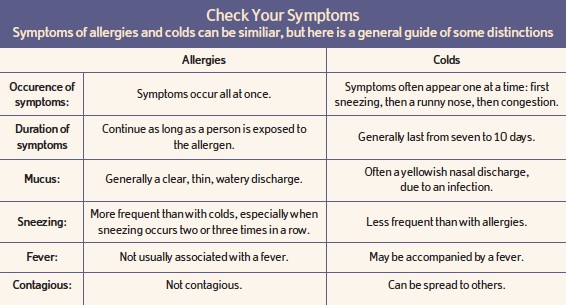Allergies: Seasonal Allergies or a Cold?

The National Institute of Allergy and Infectious Diseases estimates that more than 50 million Americans suffer from allergic diseases. Allergies are the sixth leading cause of chronic disease in United States. They arise from loss of the body’s natural resistance to allergens – substances that in some people the immune system recognizes as “foreign” or “dangerous.” These same substances cause no reaction for most people. An allergen can be almost anything as long as it provokes an allergic response in a person.
If the onset of symptoms is rather sudden and these same symptoms occur at the same time every year, it is usually indicative of a seasonal allergy. If you are allergic, your immune system reacts very quickly when it encounters a certain substance, because it mistakenly thinks that substance is “dangerous” to you.
Seasonal allergies are caused by pollen and spores. They can occur at any time of the year, but frequently they start in early spring through the end of May, when the primary cause is windborne tree pollen. This is followed by grass through mid-July and ragweed from late summer until the first frost. Mold spores typically peak in mid-summer and last until temperatures begin to drop. The problems are complicated by pollen and spores carried into your home on clothes or through open windows.
How can I reduce the effects of seasonal allergies?
- Take off your shoes as soon as you enter the house to avoid spreading allergens.
- Keep your home and car windows closed, and run the air conditioner to keep cool.
- Avoid mowing the lawn, keep away from freshly cut grass, and try to limit outdoor exposure on windy days.
- Know the pollen count for your allergen and stay indoors when it is high.
Treatment of seasonal allergies can include over-the-counter or prescription antihistamines, nasal steroid sprays, decongestants, as well as alternative treatments. Many of the medications have ingredients that can elevate your blood pressure and heart rate, so it’s medically important to ensure they are appropriate for you. I encourage you to discuss your symptoms with me.


